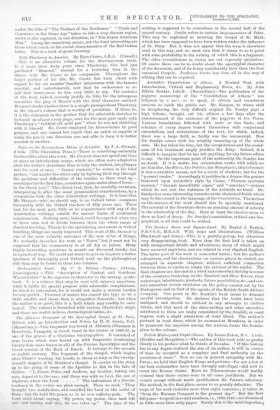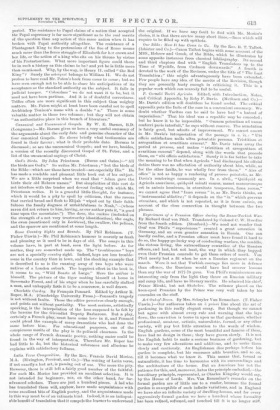British History and Papal Claims. By James Paton, B. #
. 2 vols. (Hodder and Stoughton.)—The author of this book tells us pretty clearly in his preface what he thinks of its value. "If this history has in any degree realised the aim of its author, it will in course of time be accepted as a complete and final authority on the questions at issue." Now we are in general sympathy with Mr. Paton ; we hold that English Kings and prelates—for not a few of our best eoclesiastics have been strongly anti-Papal—did well to resist the Roman claims. Even an Ultramontane would hardly contend that these claims were in all cases justifiable. But we cannot accept without much qualification Mr. Piston's advocacy. His method, in the first place, seems to us greatly defective. The scope of his work includes more than eight centuries ; it takes in "from the Norman Conquest to the present day." But the first 500 years—to speak in round numbers, i.e., 1060-1513 —are dismissed in little more than sixty pages. Surely this is the most important
period. The resistance to Papal claims of a nation that accepted the Papal supremacy is far more significant as to the real merits of the question than any action of this same nation when it has broken with Papal authority altogether. The resistance of a Plantagenet King to the pretensions of the See of Rome means much more than the fierce struggle of Elizabeth for her crown and her life, or the action of a king who sits on his throne by virtue of his Protestantism. What more important figure could there
be in such a history as this claims to be ? and yet he is little more than mentioned. Why, by the way, is Henry II. called " the Red
King "? Surely the sobripect belongs to William II. We do not
profess to have read Mr. Paton's book from cover to cover ; but we have seen enough not to be able to share his anticipations of its
acceptance as the standard authority on the subject. It fails in judicial temper. " Colourless " we do not want it to be, but it need not have been partisan. And it is of doubtful correctness.
Trifles often are more significant in this subject than weighty matters. Mr. Paton might at least have been careful not to spell Archbishop Tenison's name with a double " n." There is some valuable matter in these two volumes ; but they will not obtain "an authoritative place in this branch of literature."





















































 Previous page
Previous page